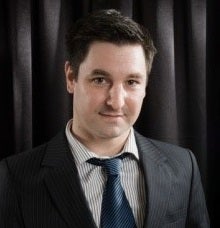 Matthew Peloso (BSc ‘04) is revolutionizing the sustainable energy sector by empowering cities to produce and consume clean energy through breakthrough technologies. The founder of Sun Electric, Singapore’s first fully licensed solar energy retail company, has an impressive background in technology management and solar energy technology research.
Matthew Peloso (BSc ‘04) is revolutionizing the sustainable energy sector by empowering cities to produce and consume clean energy through breakthrough technologies. The founder of Sun Electric, Singapore’s first fully licensed solar energy retail company, has an impressive background in technology management and solar energy technology research.
Matthew is invited regularly to speak at industry forums and summits on topics ranging from energy policy to solar innovation – he recently gave the compelling presentation How Financial Technologies Can Revolutionalise the Renewable Energy Industry at the Canadian Chamber of Commerce in Singapore and Waterloo’s Institute for Sustainable Energy (WISE).
Today he’s talking with UWaterloo about how the University helped him get started as a globally successful entrepreneur.
You started your career in photonics, and then researched quantum cryptography and solar energy technologies. How did your research spark your interest in solar technology and lead you to founding Sun Electric?
Research feeds your curiosity, and, I believe, truly gives you freedom to explore your thoughts. Through research I formed a rational view of material physics contrasted against my creative ideas, which I think helped me build intuition. More specifically, I managed to achieve a few more advanced projects which made me finally come back to look at commercial opportunities for technology after I had refined my skills.
Sun Electric transforms the way communities consume energy by connecting rooftop owners with clean energy customers, and blending solar energy into a city’s electricity. Can you tell us more about this?
One of the opportunities we foresee is society’s journey from the advent of electricity some 100 years ago (at least the broad deployment of power systems) built on a utility model, to our world today where information systems and renewable power can impact all. Sun Electric has commercialized rooftop solar such that buildings and consumers connected through an electrical network can trade power which is captured from the sunlight striking rooftops all across the city. The platform, test-bedded and launched in Singapore, is called SolarSpace.
You currently work with government agencies and companies to maximize the potential of unused roof spaces in Singapore. How have people responded?
Before I started the firm, I was negotiating with hundreds of clients. Once we developed a different idea on how to deploy solar power generators on rooftops, we became lucky to work with some of the larger industrial property developers in Singapore, and have a few abroad which we hope we can continue to develop with. The results have been dramatic, recognizing though that this has taken four years or more of work from testing to commercialization, and now development. We have an opportunity to expand on a few hundred rooftops through the coming three years now.
Did anything at Waterloo influence you to enter the renewable energy industry?
At Waterloo, I was fascinated by modern physics, specifically quantum and its potential application in information and communication systems. It was only until later on in my graduate work that I started to progress into the renewables sector. In part, I felt I had achieved some of my goals by completing a few experimental papers in quantum optics. Then, the writing was on the wall – I was looking for a more applied engineering project where I could make a direct impact on markets as an entrepreneur, and the renewable sector (including research in it) was growing rapidly and attracting funding.
Sun Electric was listed as one of the "World's Top 10 most Innovative Companies in the Energy Sector" by Fast Company in 2016. Congratulations! What does this recognition mean to you?
It was an honor, and it made me appreciate the long journey through building a startup and testing and commercializing technology. Who doesn’t smile at some recognition? It helped me to solidify ideas I bounced around in the past which I wanted to pursue, and through the work and support we obtained in Singapore we really got to complete a project which demonstrated a better way of doing things.
What does it mean to you to be a part of an institution celebrating 60 years of innovation? What do you see for the next 60 years at the University of Waterloo?
Waterloo is an admirable University, with a great story from its founding. I still look back at the Math Faculty and think how it helped the University, and thus many students, to articulate their future and develop significantly. It means when you think differently you eventually get to see the impact of that. Waterloo will continue to think broader into the next 60 years. Sun Electric also hopes we get to combine efforts with Waterloo and we are active now hiring co-op students to help us on our journey forward!




